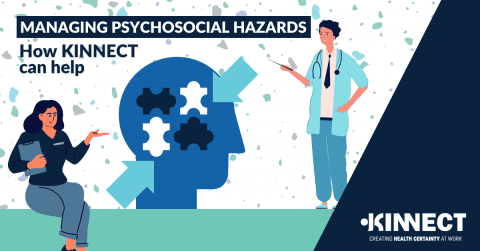Managing psychosocial hazards at work: How KINNECT can help
The current buzz word for Occupational Health; psycho-social hazards.
Most jurisdictions in Australia have recently introduced new codes of practice for managing psychosocial hazards at work, with Queensland’s the next to become mandatory from 01 April. This comes off the back the back of Australia’s adoption of the International Standard ISO 45003: Psychological Health and Safety at Work.
The codes are prompting an increasing number of enquiries from our clients in recent months about they can proactively manage psycho-social hazards at work and how KINNECT can help.
But first, what is a psycho-social hazard?
SafeWork Australia says a psychosocial hazard is “anything that could cause psychological harm” (e.g. harm someone’s mental health). There is a long list of psychosocial hazards at work which include job demands, low job control, poor support, lack of role clarity, poor organisational change management, inadequate rewards and recognition, poor organisation justice, traumatic event or material, remote or isolated work, poor physical environment, violence and aggression, bullying, harassment and conflict or poor workplace relationships.
 As a one-stop shop for all things occupational health we spend approximately half our time helping people to recover from injury, while the other half is certainly spent preventing injuries from occurring in the first place. We don’t just mean physical injuries either.
As a one-stop shop for all things occupational health we spend approximately half our time helping people to recover from injury, while the other half is certainly spent preventing injuries from occurring in the first place. We don’t just mean physical injuries either.
Our multidisciplinary team includes Psychologists and Rehab Counsellors so we are well-equipped to deal with psychological conditions too.
Reducing the risk of psycho-social hazards from occurring is a must under workplace health and safety codes of practice. To do this, employers need to know where the risks are in their workplace and put in place the right measures to mitigate risk.
So how can KINNECT support you with this? We can support our clients to tackle psycho-social hazards in a few different ways.
Understanding the Psychological Risk of Job Roles: The Job Dictionary
While many employers have job dictionaries for roles with high physical demands, it’s important that psychological demands are not overlooked. KINNECT can work with you to complete, review or update your job dictionaries to ensure that the psychological risks are objectively assessed alongside any physical requirements. This is also known as a Psychological Job Demand Analysis.
For example, a role for an assembly line worker might have physical demands and like repetitive movements in a fixed posture, lifting and carrying items. The psychological demands might be that the work is monotonous and that there is little job control. The physical demands and psychological demands can also be related with one impacting on the other and putting the worker at further risk of harm.
Once both sets of demands are understood via the job dictionary, measures can be put in to mitigate the risks; for example, changes may be recommended to the way the job is designed, or completed or how the risk can be managed appropriately.
A KINNECT Psychologist along with an Occupational Therapist, Accredited Exercise Physiologist or Physiotherapist, team up to provide our comprehensive job dictionary service so that you can a clearer understanding of the risks within all of your job roles.
Screening – Psychological RISc Assessment
One of the tools that we can also provide our clients with is the KINNECT ‘Psychological RISc Screen’. The RISc (Stands for Resilience and Integrity Scale) is a tool we’ve developed with a clinical psychiatrist and psychologist and to help employers to identify individuals who might be more vulnerable to the risk of psychological harm in the workplace.
The screener is a simple yet effective way to evaluate the psychological risk. But how can you use it?
RISc Screen can be used as part of pre-employment screening to assess a candidate’s suitability for a role. Candidates’ traits can be matched against the requirements of a role so that you can achieve the best match in recruitment.
It can also be used proactively with employees as a screener to determine where support may be needed.
Just 60 questions in an online format and you can access useful insight from just $40 per person. Learn more about the RISc Screen tool on our website:
Integrated Psychological Support in the Event of Physical Injuries
Whilst around only 6% of workers compensation claims are for primary psychological injuries, the impact of a physical injury and a person’s psychosocial situation can seriously increase the risk of secondary mental health impacts. The connection between physical and psychological injuries is strong. For example, suffering physical harm can lead to mental health issues like post-traumatic stress disorder. Feelings of isolation and frustration while taking time off work can cause like depression and anxiety.
It’s important to put in place practical support to prevent this from occurring during the return-to-work phase.
If an employee is referred to us for a rehabilitation for a physical injury, our Workplace Rehabilitation Consultants are trained to assess their needs holistically and identify individuals who may benefit from Adjustment to Injury Counselling or other psychological support.
Adjustment to Injury Counselling are sessions provided in-house with a KINNECT Psychologist or Rehabilitation Counsellor.
In some jurisdictions (including Victoria), the rules require KINNECT to refer a client for these services with another provider, however as a client-centred provider, we are more than happy to do this.
Adjustment to Injury Counselling sessions centre around an evidence-based framework with the focus of assisting injured workers overcome the variety of psychological barriers that may directly delay or prevent a successful return to work. Sessions are tailored against the individual’s specific needs, but can address issues like chronic pain, depression, anxiety, PTSD and difficulties in the person’s life.
When conducted concurrently with a Return to Work Plan, KINNECT’s Adjustment to Injury Counselling can facilitate a timely and durable return to work through the provision of proactive self-management techniques that provides an injured worker with both coping strategies and support during the rehabilitation process.
Chat to us about your needs
There are many ways for employers to proactively manage the risk of psycho-social hazards.
Want to learn more about KINNECT can support your business, please reach out to of our account management team to learn more.
Want more information about the codes of practice?
Check out the following links:
- SafeWork Australia,
- WorkSafe QLD,
- SafeWork NSW
- WorkSafe VIC
- DMIRS WA
- Worksafe Tasmania
- Worksafe ACT
- NT Worksafe (expected to be published in 2023)
Ready to partner with KINNECT?
Request a Service
Know what you need from us? Request a service from us right now.
Locate us
Have a need in a particular location? View our service capabilities throughout Australia.
